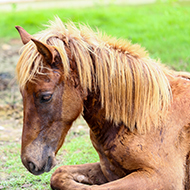
Participants will have access to a range of online resources on the topic.
The University of Edinburgh's Royal (Dick) School of Veterinary Studies has released a self-study CPD course on equine grass sickness (EGS).
Aiming to improve veterinary understanding of EGS, the short course explores all aspects of EGS, including understanding the aetiology, epidemiology and difficulties with a veterinary diagnosis.
Suitable for veterinary surgeons, veterinary nurses and horse owners who wish to further understand the currently incurable disease, the course also includes information on nursing horses in the equine hospital environment, nursing at home and ongoing rehabilitation of horses.
For a price of £120, participants will have three month access to online resources, including lectures, a reading list containing peer reviewed open access journal articles and quizzes to test knowledge and understanding of EGS.
Registration for the course is available here.



 The Animal and Plant Health Agency (APHA) has updated its online reporting service for dead wild birds.
The Animal and Plant Health Agency (APHA) has updated its online reporting service for dead wild birds.